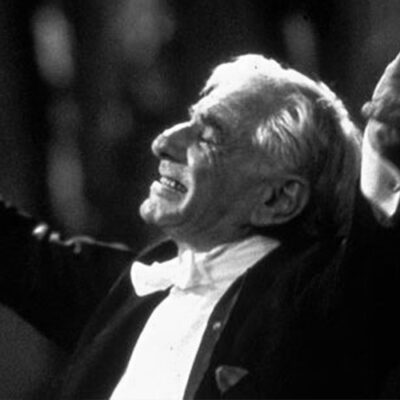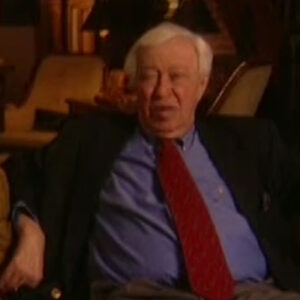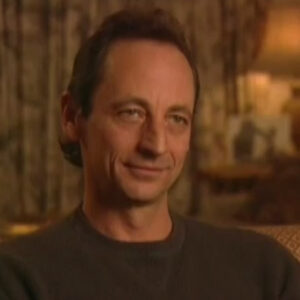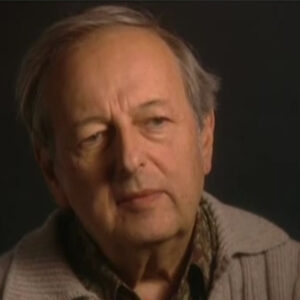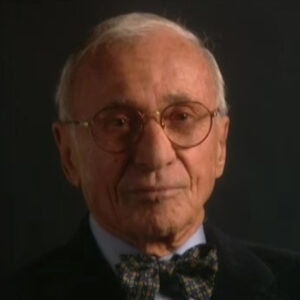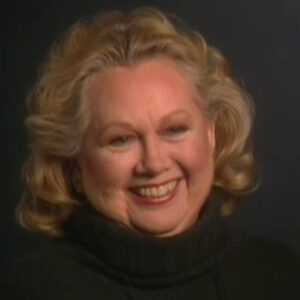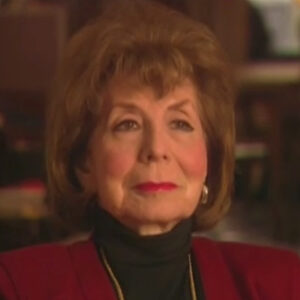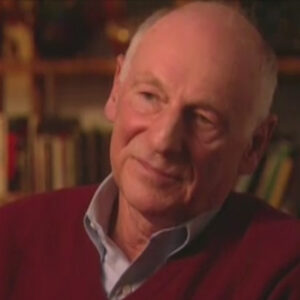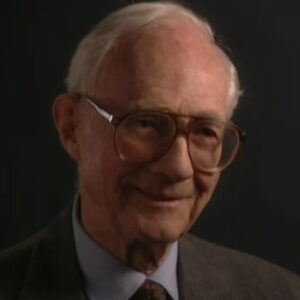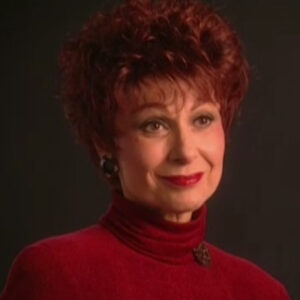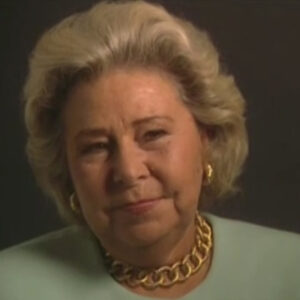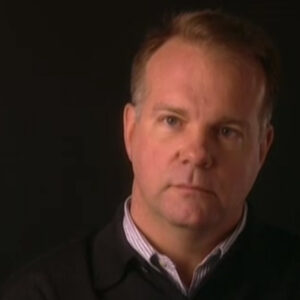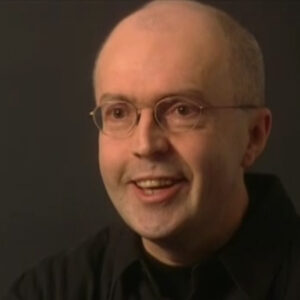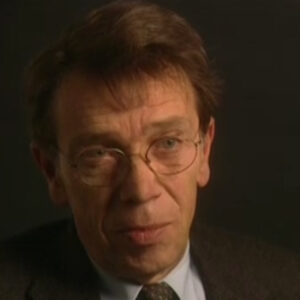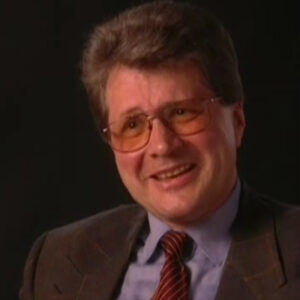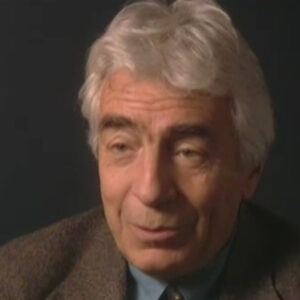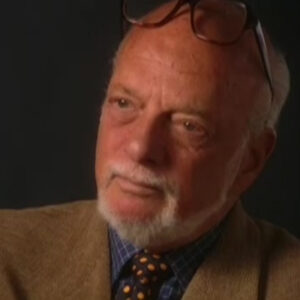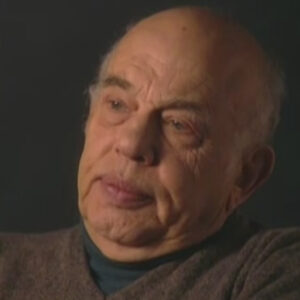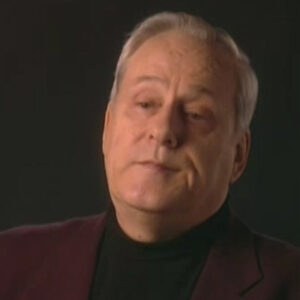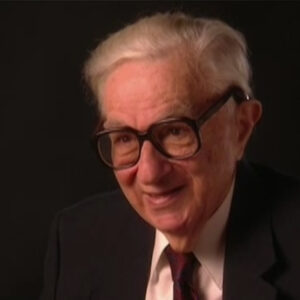Speaker Yes, I suppose you could you could say that the beginning was 1971 when I met Lenny, but anybody who grew up in America in that era that I did in the 50s and 60s would have no money from television.
Speaker And I I certainly was aware of him. He was the second conductor I ever saw because Toscanini was the first one on television. And then came Lenny. And that was quite a difference. I mean, I was really little on Toscanini was broadcasting. And so I just have a vague memory of that. But Lenny, I do remember and I also remember not particularly liking him because the younger I was, the more I knew everything. And I certainly was suspicious of this guy. And I think there was always an atmosphere about Lenny, where there were people who doubted his talent, maybe his talent. But certainly there was something about the use of the media, the use of being so clever, being so articulate that really annoyed some people. So I was certainly a bit of a product of that, though I certainly enjoyed some of his recordings. But when I met him in 1971, it was as a conducting fellow at Tanglewood.
Speaker Now, can we go back? Yes, don’t forget that. Yeah, I read the piece you wrote Prepared Better Prepared for the better.
Speaker Oh yeah. They called it the some tickets. Yeah. And we talked about that. Yeah. And they didn’t really love West Side Story. Yeah. Yeah.
Speaker I remember very well. Well what was funny. Yeah. Oh sure. Askwith. Yeah.
Speaker This sense of just did you feel a distrust of Lenny because he was on television which they didn’t particularly like you. What was, was he not coming across as authentic.
Speaker Well there were two things about Lenny’s persona on television. One was that he was quite removed. The accent was strange for a New Yorker. There was something I didn’t know what it was at the time, but that kind of Harvard Boston accent. And and if you relook at some of those omnibus and programs and the young people’s concerts, there is a kind of lecturing that is at one. And the one side he reaches out to a public, on the other hand, is still teaching you a lesson. And of course, there was the manner of his conducting, which was very offensive to a lot of people. It was exciting to some people and very offensive. I think, you know, the public generally and critics generally notice what is unique about an artist, but they may describe it in a negative or positive terms. So you can say, you know, Hemingway’s sentences were too short or he was brought perfect sentences which never wasted any time. On the other hand, you could say Thomas Mann sentences were just too damn long. And so it’s not that people don’t notice what it is that’s unique about the artist. They just may not like it. And in the case of Lenny, he was quite controversial. I think people forget that, you know, once someone dies, there is the tendency to to make a history in which a person’s life somehow is simple or logical or goes from point A to point B to C, having worked with Lenny for 18 years. I mean, and he was, of course, the most famous person I knew. And for a long time, I knew that his life didn’t go from A to B to C. And that was also quite interesting when I was a kid and I thought things went from A to B to C, and I saw Lenny on television, I found something about it just, I don’t know, just a little off-putting for a kid, for an eight year old, for a nine year old, for a teenager. When I met Lenny, I was about to turn, I guess I was twenty five and I became his assistant when I was twenty six the next year. And Michael Tilson Thomas was at Tanglewood by the time I got to Tanglewood in seventy one. I had been teaching at Yale for four or five years and had been conducting the Yale Symphony and all of that and and had of course studied conducting because I was a conductor there and it was a very difficult summer. Again, Tanglewood, one always likes to talk in terms of how wonderful everybody is. It wasn’t wonderful because that was the first time I met other conductors my own age. And that isn’t wonderful.
Speaker And it’s really foolish to say that everyone’s friends, because they are especially when they’re 25 and they have what they think is their whole lives in front of them. And Michael was on the faculty, which also annoyed a lot of my friends, a lot of my colleagues, as it were, because what was he doing teaching us anything? And I I really love what Michael had to say.
Speaker And I was I’m always happy to learn something from somebody. And and and Michael would say to me, just wait till then. He shows up. Now, Lenny was finishing his mass in the summer of seventy one and which and he came only for I think a week. And I was at Tanglewood for ten weeks and he connected the Missa Solemnis, which he referred to as this other guys I met. And and I remember and what happened to you as a conducting fellow was, you know, you’re the grand prize, which you got the conductor, Leonard Bernstein, and I remember I guess it was my three other colleagues who were who were conducting fellows the day that when he arrived, all went back to their apartments and studied and went crazy. And you just being so nervous. And I just hung around to talk to him because I figured if I didn’t know Tchaikovsky’s Romeo and Juliet by then, I was never going to know. So I ended up having lunch with them, just the two of us, while everyone else was cramming and trying to memorize sections of whatever piece they were playing. And then came the inevitable moment where we got to conduct for Leonard Bernstein. And this was quite interesting, I should say, that before this happened, there was a rehearsal. The conductors were put in the chorus because what else can we do? We couldn’t be offstage conductors for the Mr. Solemnis. And and by this point in the summer, I guess it was five or six weeks of the summer, most of the students were pretty grumpy. I mean, everyone felt abused, overused, angry about this or that. The food doesn’t matter.
Speaker And Lenny must have spent three hours on the Curia with the chorus, which is a lot of time. And when we got to the end of the rehearsal, someone had said, maestro, the rehearsals over and said and he said, oh, and we all went, oh, well, we’ll stay. And then I said, You can’t stay because you have to leave. I said, well, we’ll come back tomorrow morning, but we’ll do this. And. And I suddenly realized that he had transformed us from being a bunch of grumpy musicians into people who suddenly were reminded of why we were musicians in the first place. And I remember going back to the dormitory and walking outside under the stars and crying because he just reminded us of actually why we were there.
Speaker So what do you talk about? Well, I was about to do Romeo and Juliet. I’ve Tchaikovsky and I just asked him about it and about Romeo and Juliet, and he he gave me one of his Harvard lectures on Romeo and Juliet and I half the time I think Lenny was making things up, which I do, too. Now, I went to Yale and he went to Harvard. And I think that’s part of the fun of our relationship, was that we would poke fun at each other and at each other’s schools. And so he taught me about what how the relationship of the slow introduction was to the Alliegro. And he said it was two to one that in most masterpieces he believed that there was really one tempo in the entire work, even if it was the work of many, many movements like, say, Handel’s Messiah or Symphony and for movements or concerto, that somehow all of the movements are related in time and therefore the slow introduction would be twice as slow as the as the Allegro. And he also talked about how he would, in analyzing the so-called love theme from Juilliard, how one would conducted where the strong beat was. And and then he said, but of course, I actually don’t necessarily conduct it that way. That’s just the theory of how it’s structured. And he also told me that when he.
Speaker Conducted, he conducted like a composer, and he he, uh, he in the great performances and the best performances that he did, he referred to them, I suppose, that way that he felt he was composing the piece.
Speaker And as he was conducting, he’d say, well, let’s bring the horns in now. And how about a simple crashin? And that his process was a process of a composer when the conductor. I find that really quite interesting. Then then I got to conduct for him, which was which was fine. You know, it was fun. I was in those days, I used to wear a Mickey Mouse watch with a red band. And and just before I started, I mean, we had some you know, everyone someone did some Mendelssohn, someone loyal and Spiegel’s and I did Czajkowski, Romeo and Juliet. And just before I started, he said, I wonder what Tchaikovsky would think to have somebody conducting his Romeo Juliet wearing a Mickey Mouse watch. And there’s actually a picture of everyone laughing at this exact moment. And it’s quite sweet. And I did that. And then we had the session in which he told us what he thought of us, basically. And it was actually quite interesting. I remember quite well because different conductors of the four of us had different attitudes toward who they were and who this guy was. Leonard Bernstein, Lenny had said to me that he thought that my beat was redundant and that too much for for too much the same. And if you’re too much the same, no one will watch you. In other words, if you don’t need to beat the next bar and for just you stop and let it happen, it’ll happen anyway. And and that was really whatever he said to me was really quite coarse, useful. And I took it quite and it was really interesting because I’d actually never seen myself conductor, you know, in those days we didn’t have video cameras where you practiced in front of a you know, maybe in a mirror. But and but I remember one of my colleagues who who was conducting to Arlen Spiegel, did not want to know anything that Lenny had to say to him.
Speaker And I remember Lenny did not fight with him, said, well, you’re a professional conductor, aren’t you? And he said, well, yes, I guess I said, well, that’s fine. Just. You go on with your life kind of thing, and then you turn to somebody else because he just didn’t want to deal with this guy, because I think probably young conductors are the hardest people to deal with if they’re if they really don’t want information to come into them.
Speaker I mean, I know that in my own life, when I meet a young conductor, would you say I mean, Lenny was so unique and his style as a conductor did that, how did that influence his ability to teach?
Speaker I think there are no good teachers, there are only relationships like there are no good conductors. I don’t think there’s such a thing as a good conductor. And Lenny is a good example of someone who was not, you know, a good conductor, except when he was with the orchestra with whom he had a relationship. Lenny in front of the Philadelphia Orchestra was not the Lenny that we’re talking about. Lenny, in front of the New York Philharmonic was the Israel Philharmonic with Lenny was Vienna was the BBC orchestra was not. And there is a terrifying ear freezing video of Lenny teaching the BBC London Orchestra how to play the Enigma Variations, which is so terrible that I can’t watch it. I watched 15 minutes of it and had to actually turn it off because it was the nightmare of any conductor with an orchestra actually hates you and why they hate you, it’s hard to know, but everything you say is wrong. And so as a teacher, Lenny could be as great a teacher as anyone if the relationship with the person he was talking to, if that was open, if that road was open, therefore, his uniqueness was simply a an a kind of way a superficial characteristic of who he was. Because one of the things I’ve learned in actually, you know, Lenny was a profound teacher for me, but so was Didkovsky and so was Giuliani. I met them each in I had maybe two years was Didkovsky and maybe five rehearsals with Giuliani and I had 18 years with Lenny. So it isn’t even actually a matter of time. It’s something that happens. A door open to some stupid image like that. It’s hard to explain. But Lenny, if Lenny taught me.
Speaker One overriding principle, it was that the great conductors are completely unique unto themselves, so there’s no business, no point in imitating anything about Leonard Bernstein. What he was was many times 100 LENY, times a thousand. In fact, the summer I was at Tanglewood in 71, there was Lennie, who was 53, I guess he was 52, about to be 53. There was Seiji, who was just starting as music director or director of Tanglewood, and there was Michael Thomas, who was the kid conductor, assistant conductor who had made it big. And the thing that they had in common was that each of them was an amplification of the original Leonard Bernstein Seijas. Our Michael Thomas Michael was Michael Times for Seiji was Seiji Time, and he was King Kong, you know, and other than that, they had nothing to do with each other. And and that’s the point about it, is that if you trust yourself and if you go into yourself and almost like a feedback system, then what you don’t do well is irrelevant. You know, it’s absolutely irrelevant what Pierre Boulez doesn’t do well, what Corian didn’t do well, what Shelties wasn’t so good at, what Leny wasn’t because you went there for what they were so great at, which was that they opened some aspect of something that is actually quite infinite, which is music. So in that sense, they gave you a brilliant illumination of a certain aspect of a piece which only exists theoretically and can only exist partially in performance.
Speaker I have opened my mouth and I can’t make my notes to myself before we leave, I have so much to talk to you that I’m sure I wanted to show the.
Speaker Two to one theory that you want to play that in his own words, in his own compositions.
Speaker Well, it’s it’s interesting. When Lenny conducted his own music, it was quite different from when he heard his own music, having gone from the the point of being someone who took notes for him to someone who conducted for him and then edited his music. And then finally, at the end of his life, I was giving him music that he’d never heard before or conducted. So there was this beautiful, really beautiful curve that no one could have ever imagined having conducted candied for him, for example.
Speaker I mean, there are certain pieces. I would say there are five or six of Lenny’s pieces that I probably have conducted as many as anything and in front of him and with him and edited with him. And so these pieces are pieces that I probably know pretty well of the people living at this particular moment in history. Candide is a good example because it’s the one that I conducted the most when I first conducted it in 74, 73, whatever year it was in Brooklyn. I had, of course, the cast album, which Krok Malnik was the conductor of. But Lenny, of course, was present for that. And in all the years that I conducted candid with him present at rehearsals and talking about orchestrations and changes, I was never prepared for what he did when he finally conducted it and recorded it for the first time six months before he died, which was quite different from anything he ever asked me to do.
Speaker So therefore, there was a there was a change in his physicality and how he heard when he, as I like to say, wrapped his arms around a piece of music. And when a conductor does that, it’s like you you embrace it. Sometimes you learn something about a piece of music, even though you’ve studied it with all the humility and all of the time you could find. And yet you never know it until you actually literally embrace it. And you can only embrace it when the other players are there in front of you. And mind you, it might not happen with another group of players. And that’s what I talked about earlier. It’s a relationship. There’s a kind of moment that happens or it doesn’t happen. And when it doesn’t happen, it’s just such a shame because the possibility was there maybe and this isn’t about Lenny, but just to give you this example, when I when I recorded the Cordiale Violin Concerto, I could not imagine what it was about. I mean, I know that sounds like a stupid thing. What is a piece about? But a composer like Vale was always writing about something. So even if you get to earlier pieces, it would be unusual to think that he just wrote a piece that wasn’t about something. And it all my work, I ask people that and no one had a real answer from me.
Speaker And it was so interesting that it was literally when I raised my hands over a group of musicians in Berlin to record it, that the entire thing became clear to me. Now, this must also have happened to Lenny because when he conducted Candide for the first time with the microphones on, he did things slower and faster and made retards in places that he never, ever mentioned or talk to me about. Therefore, to answer the question of the two to one theory, I think that there were two minds going on. There was the intellectual in Lenny who was quite voracious. You know, he had the advantage of being an insomniac for a lot of his life, which is not usually an advantage to most people. But for him it was because he read all the time. And when I first was working with him, he wasn’t a sleeper. And so when you’d see him the next day, he had been up all night reading two or three books. So he certainly had an advantage over the rest of us who who were asleep for eight or nine hours. And and so the intellectual side of him actually wanted wanted the two to one relationship to hold true. But the passionate, you know, spiritual person knew that that was irrelevant and it was something that he could hang his hat on. But it wasn’t it wasn’t really what happened isn’t the use of a hat because you put your hat on your hat, you don’t hang it on that thing.
Speaker And so that’s where the two Lanie’s I mean, many times when I connected for him, I Chichester Psalms in Israel, whatever he’d say, this is too slow or you should slow down here. And one of the funniest things is we talked about Jewish upbeats. Now a Jewish upbeat is is when you know, when a piece is like and for and when you get to the fourth beat, you slow down. So you’re going one, two, three, four, one, two, three, four, one, two, three. And he referred to as a Jewish upbeat because you went Sadan, you know, and I remember when I was conducting mass in Vienna for him and he was giving me notes, he said that my Jewish upbeats had become positively anti-Semitic sort of things ever. So he was definitely in there telling you how he wanted his music to go. But then when he did it, it was yet again different. And that’s because also I think he was rewriting it with a. I don’t think it was better, I think it was different, I think, for example, the candid recording is sometimes so unbelievably slow and unlike anything he wanted when he was objectively listening to it, that it gives, I think, a false representation of the cool composer listening to a work as opposed to the conductor who was now reworking it.
Speaker And yet there is about 25 percent, I think, of this county recording that that is so illuminating, so moving, so awesome that you forgive everything that happened before it. And I know even saying that some of that recording is odd or disappointing sounds presumptuous for me because he was the composer. But I think we have to we have to separate the composer guy and the performer guy. And that’s as true of Stravinsky or anybody else, any great composer who conducts his or her own music.
Speaker After Lenny was the greatest conductor of Kopans music, far greater than Aaron was at his own music. And people will accept that thought. So I think maybe they might accept that sometimes Lenny, in his own music, maybe moved in a different direction. Also, I think a composer who is in the case of Lenny conducting Candide in nineteen eighty nine that he had written in 1956 until 1971 will change. It will make it more, make it newer, that’s all you know. And in some cases, composers like Verdi rewrote their works 30 years later to make them more current and more. You know, al-Hamad, in the case of Stravinsky, he rewrote his pieces by re recording them every 10 years and making them sound more contemporary, by the way he performed them.
Speaker That’s interesting. Well, certainly can leave. Candy was going to have more competition.
Speaker Well, that was an interesting journey. I don’t know if you want to talk about that.
Speaker Very much so. And let me just start. Sure thing that.
Speaker It’s so complicated. I know the story. There’s no way in this film, yeah. That we could have time, the whole thing.
Speaker But if you could talk to me about it in a way that and I know this is a tall order, but I really love you.
Speaker First of all, just as this is one of the most whatever you think about it troubled me. You know, it’s done.
Speaker Let me show you if you like like you want three minutes on this piece, you want the three minute mad scene on Candide. Yeah.
Speaker Where you it in between, you know.
Speaker OK, let me let me just I came to Candide. I was when I was a kid, I of course had all the all the recording, all the cast albums and everything. You know, when I was something of an expert on music theater and I never particularly liked candy. I mean, I was a Rodgers and Hammerstein kind of kid. And because it just seemed I know it didn’t seem like a natural work, it seemed intellectual. I thought when I was 13 or 14, it didn’t flow with the kind of seemingly natural grace of Rodgers, a Rodgers melody with words that were were just there. And I thought, Candy, there’s something odd about it. And I don’t know what I tried to put my finger on when I was asked by Lenny to work on the version in night in the early 70s with Helprin’s, I started learning something of its history. And all that people need to know about Candy is that it opened in the mid 50s and it was a failure. And and because in those days, even musicals that were failures got cast albums. There was this cast album of candy which kept it alive and it kept alive because free of the decisions of a producer, a director, a costume designer and audience in Boston, or an audit or a review in The New York Times, there was the music which you still could hold a 12 inch disk and in this kept inspiring people to fix it. It wanted to stay alive. And so from 56 to 71, people would try and fix it. And each time they’d fix it, Lenny would oblige by writing another song, you know, let’s take out the scene and put it in the scene and Lenny would write the song. So between 56 and 71, there was two books worth of music to candied enough candy. Son of Candy and Candy meets the Wolfman Abbott and Costello meets, you know, just one of those things. Now, all of them were failures of one kind or another in so far as they didn’t run for a long time. Hal Prince had the idea to shrink it down, put it make it a one act version, an entirely new book, which is to say it followed the ideas of Voltaire. But but the tone would be different and all the spoken words would be different. And in case new words were needed for the song, Steve Sondheim came in for that. I was asked to be music director, which meant that the new book needed to put have the songs put in new places. There was no opening to the show. There was no you couldn’t use the song Elderado because that was the one song that had words by Lillian Hellman and that was part of the legal agreement. So when we went to Eldorado, there was no song. So John was the guy with the two volumes written from 56 to 71 to try and put songs in the right place. That would make sense. And that’s what I did. That version was a huge success. It went to Broadway. It won a Tony for Advancement of the musical theater. OK, then people said, but we’re we’re missing so much of the music. Let’s add more music and let’s do an Opera House version. So we all said that’s easy to do. I can do that because I’ve already been through this process throwing things out. Now I can stuff them back in. So we made a one act show into a two act show. And once again, I was finding places for all this music. And again, Steve and we got more words from from Steve. And and there was then the Opera House version two acts at New York City Opera. Again, a huge success. Now, in all of that, Lenny was never happy and he didn’t really want to say it. But Lenny was not one to hide his feelings. So he said things like, well, you can’t argue with success, which was about as far as he would go about both of these versions because he missed the the essential seriousness of candy.
Speaker You know, Lenny’s music is all about one thing. There’s the philosopher who said that, a great, great man. Right. One work and and geniuses write to and in. Lenny, I think probably wrote one. He wrote one like Mahler wrote one work. He just wrote nine symphonies of one work and Beethoven wrote two. He definitely wrote two works. And Lenny was writing one in his one work was about, you know, about life and the vicissitudes of life and yet how much we love life and how we should be honest with each other and forgive each other and get on with our lives. But this version, these versions that we did were all too, too silly. There was no seriousness.
Speaker When I became music director of Scottish Opera, I knew I wouldn’t have Beverly Sills or Hal Prince as a boss to shape another candidate. And I called up Lenny and I said, I don’t know if you’re ready for this, but. I would like to do a third version of candid one that went back to Voltaire, that the words were Voltaire’s and I and I and I looked at a place in that book. There are two chapters in which the old lady tells her life story. And at the end of the story, which is ends with one of the longest jokes ever written and about her in a unit, which is quite funny. But in the versions we had done, the eunuch joke was the big laugh, and that was it. But after the eunuch joke, she says, So here I am, despised old with half a buttock, the daughter of a pope. And yet I always have loved life how many times I’ve wanted to kill myself. And yet I cling to life. And it’s a beautiful little speech which I’m hardly even paraphrasing here, worthy of Voltaire. And I read it to Lenny and I said, this is, of course, the center of this whole picaresque story that in spite of everything that happens, that the people in it still love life. And I said, so why don’t you set this to music? And of course, at this point, Lenny would never have, you know, who would write the words did it anyway. Let let me come to you and show you how I can put all the original words and all the music into the right countries. So all the French music is in Paris and all the Italian music is in Venice and all of you. And and he said, OK, you know, he was open for this. So I flew to Amsterdam, where I guess he was conducting the concert about maybe and I made the list and I showed how we could start in Westphalia and in Venice and and that all of the serious music of Candide, which had been thrown out one way or another, a lot of it could be restored. Now, anybody who looks back at 56 and says, why didn’t you just do the fifty six version? The reason for that is that the book by Lillian Hellman was really not even funny. It was quite, really heavy and did not match the style of the music, the kind of souffle quality, this moving fast. And and it didn’t have the kind of rapier wit that the lyrics of John Latouche had. So therefore it always held us down and there wasn’t a joke and it didn’t do it. So and also so much had been cut from Boston to New York that even if you did the so-called Broadway version of 56, you would also not have maybe 40 percent of the musical. And he had written and let’s face it, the reason you revive and you love a piece of music theater is the music and the words. And you fixed the book to make that as the medium for that. Otherwise, there’s no point in doing no one wants to do sadhus play of Tosca. You know, you do Puccini’s Tosca only because of that. Otherwise don’t do it. So in the case of Candide, we we started working on this for Scottish Opera and the happiest moment for me was going back into those two volumes yet again and seeing if we’d left anything out. And there was a song that Lenny had written for Candied, and I think it was for the first London production for Candy just before the end of of the piece in which he said, Get up, everybody, let’s go to work. And I said in this piece didn’t work for lots of reasons, one of which because it was already what the finale was going to say. So how could you say it again? But also the style was odd. It sounded like Hindemith had written it, but in the middle of it was this chorale. And the crowd tune was Life is neither good nor bad. These are the words life is life. And all we know good and bad and joy and will are are are are are finally woven, are woven, fine, are woven. Find all the joys that we have known, even all the all the evil we have known, even paradise itself is nothing now. Nothing. No, no. This is absolutely brilliant moment. And I said, Lenny, if we could put this the chorus singing this just before the finale. It would be great and if we could figure out a way to use this corral as a kind of something that we place at the beginning of Act One and somewhere in the middle of Act two, there would be a way for us to be prepared for it and and put it under the old lady’s speech and restore these words where she says, I love life. And this really got him excited.
Speaker And then he decided to put in some more. Some more, you know, it must be me. It must be so the Candy’s lament. And we went for the whole the full monty of everything. You wrote both syphilis songs. I mean, we hit them with everything. And this opened in Glasgow and he came for that. And and and it was great. And that’s the version that finally opened in Glasgow. We went down to London with it. It won. This is such a great story. And I’ll tell you, you know, Candide was a flop in 56. Then in in the 70s, it won a Tony for a special advancement of the music theatre.
Speaker Then when the City Opera did the Opera House version and we recorded it, I won a Grammy for Best Opera Recording. Then when we did it in Glasgow, this last version, it came to London and it won the Olivier for Best New Musical. And then Lenny recorded it and after he died, he won the Grammy for Best Album of the Year. So therefore this flop musical went from being a flop musical to being best new musical, what, 17 years later, best opera and best classical album. It’s an extraordinary story, but at least I think now the work is done now of the love equation.
Speaker Yeah, well, it was a concert performance was filmed. Yeah, it was videotaped. And and when you see that, you see how sick Lenny was and everyone was sick, the cast was sick and Lenny had bronchitis and he had his emphysema was acting up. And of course, he was also at this point, also terminally ill. So I find it hard to look at I mean, actually, because I knew him so well, I can feel his breathing in those last performances. I can feel the effort of the inhalation and the exhalation. Many times in Lenny’s recordings, you can hear him breathing because he was a rather loud breather. And I find that very disturbing. You know, I find it hard for me. I mean, I was with him the Thursday night before he died, and I was lucky enough to sit at his bedside. And it was it was it was a wonderful, wonderful time. It was a perfectly beautiful time, because normally in the autumn, I’m never in New York because I’m conducting in Europe. And for some reason, I was free for these two weeks. And I knew Lenny was sick. And I talked to him on the phone. And then I got the call that I probably ought to visit him. He wasn’t seeing anybody, but he would see me and. And I had just recorded the three penny opera and this and that he wanted to know about our son, who was his godson and what he was doing, and one had a chance to actually talk about projects. And I was able to tell him that the Hollywood Bowl Orchestra was being created for me. And he was so excited about that and what that meant. And it was really extraordinary because I remember saying to him and I said, are you 71? And he said, no, I’m 72. And I said, I was afraid of that. And he said, Why? I said, Well. You know, when I became your assistant, you turned 54. I remember that birthday because Betty and I were invited to it and it was at his house and it was just his family, you know, it was so special. And then two weeks later, I turned 27 and I remember thinking, I’m exactly half his age and it’ll never happen again. It was a beautiful moment. But then I later realized, because Lenny being the kind of scholar of Judaic studies, that nine was a really important number and five and four make nine and two and seven make nine. And he was born in eighteen nineteen eighteen, which of course makes it nine. And I was born in 45, which of course makes nine. He died in 1990 and nine and zero makes nine. But more importantly for us, I was 27 when I became his assistant and he was 72 when he died, which is the inverse. He was turned 54 when he died and I had just turned 45. And so it was a complete triangle is complete mirror palindrome, something extraordinarily beautiful and strange. And and I said I said this to him and he just kind of shook his head and he said, and numbers have really meant a lot in our relationship. And it’s just, you know, I was brought up a Catholic and we and Catholics don’t think about we don’t do numbers. We do the Trinity and that’s it. But this was something absolutely extraordinary. And to have had the moment of realization of that at his deathbed, you know, sitting there and seeing out of the corner of your eye the wheelchair, I mean, he looked like Lenny. He looked fine. I mean, he’d lost some weight, but that wasn’t such a bad thing. He was still tanned, you know, but then out of the corner of the what’s the wheelchair doing there? And of course, the fact that he was in bed, you know, you didn’t see him in bed. You know, he was always dressed. That was a little odd. But on the other hand, it was his bedroom, so it was OK. And that was a very special thing. And then Sunday night, the phone call came that he had died. And I remember then our son was doing his homework and and I said to Betty when he died and it was it was there was about a half hour where only we knew, the family knew and just a few people knew. And I knew I had to go in and tell my son this. And this would be the first major death in his life. And Lenny was his godfather. And and I held off because, you know, it was just going to change everyone’s life. And then I had to go in there and tell him. And I remember, you know, I went out and I got a pizza and we opened up some coke and we just had for dinner, a pizza in our house. And we had the other we had the radio on. And somewhere in the middle of the pizza, the announcement came. A lot of friends had died and our little secret was now out in the open. The funeral took place, you know, a few days later. And it was, of course, very moving and very difficult. But what was so amazing was that from the funeral, I had to leave for the airport and fly to Los Angeles because the next morning, Wednesday morning, they were announcing the Hollywood Bowl Orchestra. And I was still wearing the suit I wore to the funeral. And it was as if the first book of my life was over and that the second volume had started and and it had been complete and had had a perfect curve to it.
Speaker Were you able to stay through the whole funeral?
Speaker Oh, yes, yes. And I remember after the funeral, I remember his brother saying he was bigger than life and smaller than death. I remember Nina trying to make a speech and just standing up there and crying. I remember Jamie. Talking about being so wonderful and funny and saying, you know, he was the luckiest guy in the world, did you ever drive with him?
Speaker He said she said, did you ever have an accident? Of course never. And anybody who ever was in the car that he drove knew that this had to be the luckiest man in the world. Because, I mean, I think I think he drove me once to Fairfield in a convertible and he didn’t I mean, driving was just he would be talking and hands and cigarettes and, you know, and never looking at anything. And you mostly were doing this while he was while he was telling you stories. And then she said, but now my father becomes a thing.
Speaker Now he becomes an icon. Now he becomes something that his granddaughter will only hear about. You can’t talk about the new movie with him anymore. You can’t in this was very, very moving because I remember at his at his seventieth, I guess it was Salmoneus birthday at Tanglewood, I made a speech in which I talked about the thing I loved about him most, which was that we would laugh so much and so much of Lenny.
Speaker And my relationship was about laughing, was about jokes. Lenny told jokes like he conducted a symphony and he taught everyone to tell jokes that way. And these I call them life jokes because sometimes they’re not even funny, but their life jokes and they take between five and 35 minutes to tell. And so when he would hear the latest life joke and these are jokes that really span, you know, these are long jokes. And somewhere in the middle, there’s a kind of a fulcrum in which the whole thing turns. And then you laugh and you realize that you’re going to have more. They depend on structure and they depend on the same thing that music depends on, to understand them and to laugh, which is memory. In other words, all structure and music has based on memory. Otherwise you couldn’t have structure because it’s perceived through time. And so we would tell each other life jokes. And I remember there was one time I was conducting Madame Butterfly in Glasgow and we did it in two acts and there was a 20 minute interval. And I had just heard this unbelievably funny joke about Schlomo the Magnificent, which I will not tell you because you’ll run out of tape. But in any case, I got on the phone and I called him. He answered the phone in New York and I said, Lenny, it’s John. He said, Oh, hi, how are you? I said, Listen, I’ve got to tell you the story.
Speaker And and just as I got to the end of it and Lenny was laughing and was practically on the floor, I guess, when I heard Mr. Moutet into the place or something, you know, it was so funny. I said, well, I got to go now. And he said, only you could have done this. I said, bye, bang. And I went I went into the pit to do that. That, that, that, that. And I knew that this was something I would miss most. The sharing of the joke. Lenny’s brother Verdie is a very, very funny man. And he would hear these new jokes and I would hear them from whatever place and the sharing of jokes was was something so sacred. And then when you’d see Lenny train someone to tell the joke, to retell a joke, it was an agony, but it was true.
Speaker It was like teaching, conducting when to wait, how to add things. And it was he was as much a lesson in conducting as anything as a lesson in life, let’s say.
Speaker I’ve never heard that before.
Speaker You know, one of the hardest things to capture in this film and I hope guess is the sort of learning because he’s back, because he didn’t show that side on television.
Speaker But you’re saying that what you what he walk a little bit. Yeah. You go well, you know, it’s very serious.
Speaker I, I think, Lenny, it’s hard to know why Lenny’s persona, the persona on television or the persona that he gave to the world or his choices were what they are. It’s impossible to to know because he was inventing his life. There were always people all the way through Lenny’s life, at least when I knew him, we were always writing about what he ought to have been doing. He should be composing more. He should be conducting more. Why isn’t he doing more of this kind of music? He should be playing more piano concertos. Why? And and then it wouldn’t leave him alone because everyone had their own definition of what Lenny should have done until finally he died. And then we knew sort of what he had done. And now we were going to be the recipients of something that would either grow or diminish in time. It’s inexplicable to me that certain music he never touched, he never conducted Mozart much, why this is it’s hard to know. I never I never had a chance to ask him. I mean, I would have loved to have heard his interpretation of the Marriage of Figaro or Don Giovanni.
Speaker Imagine that. But it didn’t seem to interest him. He was more interested in Haydn than Mozart at the same time. Imagine if he had conducted Alban Berg’s Lulu or Waseca and and then and if he had championed music of the emigre composers, the Hollywood composers. He he after all, he made his debut with the New York Philharmonic and one of the pieces opposed by Nicholas Rosia. He never touched Rosea again. Imagine how we would view music differently had Lenny championed the music of Rosa Newman, Stiner, Waxman, all the emigre composers in Los Angeles, as well as the American born film composers. Had he in fact played that music, but he never did. I’d like to ask him why someday. The other hand, Lenny never conducted music of his colleagues on Broadway, and he never conducted his own music for Broadway except in studio recordings. I mean, Candide had to wait until the year before he died. West Side Story again, except for I think maybe one performance when it reopened on Broadway, but hardly known. He really conducted for the first time when he recorded it. And I think this was also a snob issue. It might not have been, Lenny. It might have been Lenny. And what is appropriate, you know, if I’m going to write Broadway musicals, I shouldn’t be in the pit because who was conducting in the pit? I’m the next generation. And I was unafraid to go into the pit. I enjoyed doing it a week. And when I do eighty eight a week, I learn a lot.
Speaker You know, there are two kinds of learning. As a conductor, you repeat something a thousand times and you learn each time and then the other kind as you do things for the first time and you have to balance both of them. I think, Lonsdorf said. Every conductor needs to have at least 40 or 50 percent each year of brand new stuff as well as repeating stuff. So why, Lenny? So why Lenny was never funny mostly, but some of the interviews, you sometimes see him funny, but he was unbelievably funny. And the timing issue, of course, you can imagine was brilliant. And and also he was could be terribly rude and he could be very vulgar. He could use language that, as they say, would make a sailor blush. And he sometimes really enjoyed shocking people because he was Leonard Bernstein. I think I knew Danny Kaye quite well and he sometimes did the same thing. There was this kind of bad boy that I could say a really bad word and still be Leonard Bernstein. And and you still have to love me because I’m Leonard Bernstein. And I think in a funny way, because he had such a big heart, you forgave him. This kind of naughtiness is the only word I can say because it wasn’t a profound evil that made him want to say something to shock everybody. But I can say that since his death, I have rarely been as embarrassed me was when he was alive and there was always the chance that he might sort of go off and suddenly in the middle of a sentence, bang, and you find yourself going, Oh, now what do we do?
Speaker You know, you became the kind of the the paint a picture of the audience in the producers. When they’re watching Springtime for Hitler, you suddenly go, everyone does that in the room, and then they all look. And then there’s a change. There’s a change of subject immediately. And these aspects of him I could never quite understand. And maybe it had to do with the kind of smartass that was, Lenny, the kid who always got his way, the kid who was always taken care of by his mother and his aunts and then his sister and then his wife. And, you know, he you used to say Lenny doesn’t even know where milk comes from. He thinks it comes out of the picture on the table because he never had to even think of how it might have even gotten to the picture on the table, not to mention the refrigerator or God help us, the cow. So there was never that attachment to some aspects of life. But but it would be hard to explain this to people who didn’t know him. What I what I found half of the lessons I learned from Lenny came from the moment he died, which is to watch him watch Lenny turn be turned into something that he had to turn into in order for people to worship the memory or whatever it is. And since he stopped being a living thing, a living object, I saw him being changed into something. I read a couple of the books and didn’t recognize him in the sense that it taught me a lot. His death taught us all a lot was because it was the first time that I really question history. I questioned assessments and biographies because I realized that the way biographies are written is that you interview a lot of people just like we’re doing now, who tell you something about a person and then the editor or the writer comes to a certain conclusion, which is not true because it’s only an aspect of the truth. And when I read Joan Pager’s book while Lenny was still alive, of course I didn’t. I saw names of. People I knew, but I didn’t recognize the person didn’t recognize Lenny, and maybe, of course, I only saw part of him, you know, he treated me in a certain way. He loved me. And he was amazed that I knew about music, theater, and we could kid about stuff from the 30s and 40s, even though I wasn’t born. He would say, how do you know that? And we would kid like to colleagues about something. And so maybe I saw a side of him that maybe another conductor or another person didn’t see. But I have to say that in his death I’ve learned a lot that every time I read about somebody, every time I read a bio, a biography, every time I read about conclusions of history, I I think about Lenny and I think about what people must think of him based on what is being written about him. And I knew a different person. And therefore I know that history is another form of fiction, something that we can find truth in, but not necessarily the truth.
Speaker It’s a tremendous responsibility. It really is. And I feel a credible here, not that this film is going to attempt drawing conclusions.
Speaker That’s what’s good about it. You’re just letting us react. Some of us have a second take. Some of us are really breaking the bank here.
Speaker Sorry, but I know one thing that I think will make a difference that I have to watch this because, I mean, how do you balance it out?
Speaker And so and I wasn’t very crowded to tell the absolute truth that Lenny doesn’t matter because he’s great. But how do you actually read anything or seen anything that smacks that comes close to the truth? I’m curious.
Speaker You know, when I wrote the one article, when I wrote the article about him for his 17th birthday and then then there was one book in which each chapter is simply a series of interviews of people who talked about him. This is the closest to the truth about about Lenny. What no one seems to be able to explain, and it maybe is inexplicable, is why people loved him so much. You know, it’s when you start talking about whether he drank beer or champagne and whether or what kind of how he talked or what he was wearing or this is also completely irrelevant. And yet this is the stuff of biographies, you know, where he was or what he said, what people said about him. And and yet this guy was able to pull the most amazing performances out of mediocre orchestras because the miracle of conducting is this thing in which every player gives up a part of him or herself to this conductor and to the music. You give up some of your individuality, maybe a lot of it. This is why a lot of orchestra players are so angry, because when the performance is over, they realize that in some way they’ve been spiritually raped. In a way, they’ve given up their self themselves into some collective thing, and they’ve stopped being Harry and Fred and Carol and they’ve become some entity. It’s the music has used us, but we’re musicians. So we are in the business, as it were. Our lives are about letting music use us. The conductor in an orchestral situation is the person through whom it all is given up to toward the music. Lenny had this ability with certain orchestras to make everyone play better than they could have if they were not with him. That’s a simple fact. So you’ll see in various times in Lenny’s lives, he recorded with many kinds of orchestras, some of the greatest orchestra in the world and some not the greatest orchestras in the world. And I was his assistant for some of for all of the above. And you saw this incredible love and sometimes hate, you know, because it was a particularly passionate character. I mean, I saw scenes with the with the with the with the Israel Philharmonic that you couldn’t believe were their arguments going. I mean, actual arguments going on in front of everybody, which you can’t imagine actually going on. And then a hug after the argument and then back to the rehearsal, I saw Lenny, you know, going into triple overtime. And then when somebody said to him, I’m sorry, maestro, you have to stop now, that he would utter an unbelievably rude thing in front of everybody and storm off.
Speaker And yet those stories are irrelevant to the bottom line, which is that the performance was was really a profoundly religious experience everyone gave. Beyond what you thought you were capable of giving and this is the essence of the great Leonard Bernstein, it was the guy who walking through the aisles of the of La Scala when we were in the middle of rehearsing his quiet place would stop and talk to the lady who was cleaning the chairs and would stop and talk to her for 25 minutes. Everyone waiting because she was interested in what she had to say. I mean that in the end, it was this character, this person, he was so complex and everything, but the greatness was so obvious. He was so obvious that, as I said earlier, he you give up any judgment about his faults. I mean, you can spend your life dealing with that. But the greatness of him was his ability to bring out the possibility of greatness in all of us.
Speaker Let me let me ask you about this woman is going to squeeze this lemon dry.
Speaker I want you to know that you say that two tapes doesn’t break the record.
Speaker Oh, um, we haven’t, uh, we haven’t begun.
Speaker How long is this show? The show is about an hour. Two hours, OK. I’m not. And you probably have 200 people who are talking to you and the film.
Speaker I can tell you that. OK, a couple of things. I’ll be in the picture. I’m going to be in your picture that we do have to talk about, um, about mass and quiet, I’m sure. Happy to. And I would like before we do that, actually, because I’m afraid I’ll forget it.
Speaker Just a moment on Tengblad sure he has such a history with Tanglewood.
Speaker Is this OK when I do this or does it. Oh ok. Oh OK.
Speaker Which, you know, back in the 30s and I have wonderful footage there and very young that look as far as I’m looking at devastating, handsome and all that and all that excitement are exciting. Early days when you met in the 70s with an older man.
Speaker Yeah. He was almost as old as I am now. In about a year. I’ll be the age he was when I met him. That old I don’t know. But it’s interesting. I mean, it actually I find it quite interesting. It doesn’t bother me because, you know, one of the things that. I think it was terribly destructive about Lenny’s career was that there are so many American conductors who thought they could do it too. And so if you weren’t famous at 27, you had failed. On the same token, there was this desire on the part of record companies and in general managing directors of symphony orchestras to find the next 24 year old. So they would appoint a 24 year old to the music directorship job in the hopes that this would be the next Leonard Bernstein. And inevitably, if the poor darling got the job and then started recording the Beethoven symphonies, by the time he was 35, no one was interested in hearing the Beethoven symphonies anymore because the kid had already played all of the cards. And of course, conducting is a is a kind of job where you develop and change throughout your whole life. And one of the most wonderful things about conducting is that as you lose your physical use something else more than replaces it, it’s a job that has an infinite expansion as you get older because it completely trades on experience and your ability to be generous and open to understanding experiences and everything, you there’s nothing that you can’t learn that doesn’t help you be a better conductor. And in this sense, I think Lennie’s Leonie’s unique career gave false expectations to other conductors and to the music world in general because there has been no other Leonard Bernstein. And and the idea of putting a very pretty face on a cover of a record turns out to have not necessarily worked out for anybody else. And Lenny was a very handsome young man. He was handsome his whole life. He he would look at pictures of himself. He said, I look like an old Jewish elf.
Speaker He would say, when you look at those pictures as he got shorter and and grayer and and and Herman, that was the name he called his belly got bigger and. It’s, you know, give you an idea of the kind of sense of humor Lenny had, there was there were a number of years when I had a personal trainer in New York named Bill and I and I would work with Bill a couple of times a week. And and Lenny was getting fatter and fatter. And I said to him, you know, let me tell you, you know, I have a trainer who’s really great. He’s not going to hurt you. He’ll come to the house and, you know, here’s his phone number just in case. So I went for one session once and Bill said to me, you know, I work with Lenny last week, I said, no, I didn’t know that. I said, oh, yeah, yeah. And, you know, I didn’t ask much about it, but the next time I saw Lenny, I said, Lenny, I hear you. You started training. He said, well, when Herman got so big that I couldn’t see Dicky anymore, I called Bill.
Speaker Very interesting paradox because everybody in the world talked about his humor and his wit and I mean, clearly he loved to pain and clearly loved a good time and all that sort of stuff.
Speaker But his work, when he wrote about his in his television was all these very seriously seems even through his letters as as they and sometimes they seem to really have been very, very concerned with the serious issues of life.
Speaker Well, you know, again, he is a paradox because one of the things that always surprised me about him was that whenever he’d come back from touring, uh, first of all, before he’d go off for a tour, he would be a wreck, a complete nervous wreck, the packing, the whole thing, the learning of music like he was about to conduct his first concert. Then I never understood. I never quite understood this ritual he would go through and he would say things. I’ve never been so tired. I’ve never I know I’ve been tired, but I’ve never been this again. Then he would come back, you know, a few months later, and we’d see him immediately after or sometimes after. And it was always a triumph. And he would quote you his reviews, which I also thought was equally odd on the other side of the spectrum because. Why would he care what some journalist said about him in Munich or Vienna or Berlin, because he was Leonard Bernstein. I mean, if they liked him, fine. If they didn’t like him also. Fine.
Speaker But why would that approbation in any way give him such joy? Like a little kid? And I remember once quoting a good review, I got to him and he just slammed me down and said, you know, you don’t need to you’re going to actually quote your review from me like that, like really gave it to me. And I went, no, no. And I didn’t say, but you do. I mean, I just didn’t know. And I just closed the book right there. And and and that was good advice. And yet he couldn’t take it. So there was this kind of this this strange thing where I know in Humphrey Burton’s book, he quotes a lot of Lenny’s letters to Helen Coates, in which he quotes how much everyone loves him and every review he got. And and he comes across as being such a spoiled brat who who is wants to just tell you and brag about himself.
Speaker And yet you never felt that there was just this moment when he came back that it was the kind of re-entry into New York where you heard this and then he became lending again. It was part of this process. Then came the times when he would try to compose and he would get very depressed because it just wouldn’t come out. It wouldn’t the music wouldn’t come out and sometimes it would. And his relationship with various collaborators is so sad, really, because so few works really came out of these long periods of time when he was when he would work. And I know that after Felicia died, there was almost a complete stop of of everything. And he was so unhappy. You know, I don’t. It’s very hard to analyze that relationship because there are certain certain things that Lenny and I never, ever talked about and they’re private and actually it wasn’t any of my business. And in sometimes we would talk about private things, but for the most part not. And certainly when during the time I first met him and I would go to their house in Fairfield, which I can imagine is a dream, you know, getting the phone call from Harry Crout saying Lenny would like it to be his assistant for Carmen. And you say, when do we start?
Speaker And he said that tomorrow and we’ll pay you a thousand dollars. And I thought, well, I’ll pay you a thousand dollars, actually, but I’ll take the thousand. I was I was writing my dissertation at Yale. It was it was a summer and, you know, and and then to get Lenny on the phone, who, of course, couldn’t use a phone, like he couldn’t use a record player. And, you know, he got on the phone, he said, you know, Jalani. And I said, I hear you’re going to do it. And I said, Well, yes, of course. Of course, Mr. Bernstein. Well, let me give you the instructions to my house. And then he put me on hold and, of course, completely cut us off because he didn’t know how to use those kind of phones that he was not meant to. Lenny, putting a needle on a record was the most horrible experience. You can imagine it when it sort of came in at an angle and sort of careened halfway across the record. And so you can imagine how my excitement just to hear how to get to his house, how you take, you know, the Connecticut Turnpike and you get off this exit and you make the left turn at the tree. But this there was so I knew him in his family and and knew the kids when they were quite young, when he left Felecia and.
Speaker And moved, moved out, and then she became ill and he moved back and she died of cancer. This was a terrible process. It’s it was an agony. And and I think in of course, in the period after her death, he was consumed with sadness and guilt. I think in some ways there might have been some secret. Release for him and that he might have felt that now he was going to be free, free of one aspect of his life to enjoy another aspect of his life. I don’t think Lenny was really ever happy after Felecia that I think he was really happy being a dad, being a husband, being. And that kind of gave him a kind of center to his life.
Speaker And when he was a bad boy, he was only being a bad boy because he knew he had the center in his life because he was fundamentally, you know, a middle class kid born of immigrant parents in America with all of the requirements and guilts and and and fears and hopes that every kid of immigrant parents would have, you know, my parents’ generation. And and so you have to understand that for him, being a naughty boy was not without its the warnings. He was not free. He was not a completely free person. He was encumbered by many, many things. And his physical life was quite complex by other people’s judgments of it. And I and I remember after in that time when Lenny wasn’t working, he couldn’t compose. He couldn’t he couldn’t conduct. And he I came up with an idea because I was teaching at Yale still at this time that he would edit Regina of Mark Blitzstein because he had sworn an oath, which he told me that Mark Blitzstein grave, that he would fix Regina. And so the project was with one of my students, Tommy Krasker, who’s now a record producer. Tommy was a student. And we would we got the manuscripts of Regina and then we go down to Lenny once a week and played the complete score. And this was a way of bringing him back to making musical decisions, not about his own music, but about somebody else’s music. And then, of course, came a quiet place, which is the opera in which Lenny really writes about his life, what he writes about his life. And Steven Wadsworth, the librettist, also was writing about his life. And so together, these two people, Lenny had lost, his wife, Steven, had lost his sister, and they wrote this this one act opera about life in America in the 80s. I guess theoretically, I mean, a sequel to Lennie’s One Act Opera, which he had written at Brandeis Trouble in Tahiti. And I remember going to the Dakota and hearing different scenes. And this learning was really excited about this. Then he was so happy with the way it was going. And it was good. It was really good. And we would hear piano and piano accompanied performances of different scenes from a quiet place. And it was very exciting. And and it was a triple commission between the Houston Grand Opera, the Kennedy Center and La Scala in Milan. And I remember that Houston wanted their music director, Johnny Demesne, to conduct to the world premiere of it. And Lenny was was very smart and very sweet. He said to me, was that OK with me? Which was very sweet. And I said, Well, of course, if it’s OK with you, you know, I was going to conduct it at the Kennedy Center. I had by this point been the conductor that Lenny had chosen to do a lot of his premieres at this point. And so he felt, I guess he was going to ask me to do it or not or whatever. He was just being really very sweet. And and Johnny Damon is a wonderful conductor. And so what’s the problem? And I’m always happy to be the guy who connects second performance because there’s so much you can learn from sitting out there and then you can fix. And so I went to the world premiere of A Quiet Place and I was representing the Kennedy Center because in those days I was their consultant for music theater and I guess music director of their orchestras. And so the first piece was Trouble in Tahiti, which is an adorable and very moving, but very simple opera using vernacular musical terms from the 40s and 50s as its as its language. Then after the intermission came a quiet place, the new opera, and it was like being hit on the head by a safe, which had been dropped from the 14th floor on your head and the audience within. See, the first scene of a quiet place is as long as all of troubled Tahiti. So therefore the expectation was completely askew. The audience would know what to accept when it was expecting, when it was over. It was not a success and it really troubled me.
Speaker And this was a moment also where Lenny was being a bad boy, because I remember I remember at the dress rehearsal, first of all, I went to see the Return of the Jedi with him. You’d never seen a Star Wars movie, which was really funny, by the way. And when Lenny went to the movies and I only went to the movies a couple of times with him, he talked as if there was no one else in the audience and they had reserved a row for the Bernstine. I don’t know how they did this, you know, movies, how do you reserve a role. But somehow it happened and we all were in a row and I was sitting next to him and I remember there was a moment where where Chewey was speaking and in. Barkha, or whatever, whatever language that is in, the words came out on the bottom and I heard Lenny saying, Is Wookey really spelled with two KS?
Speaker And it was a typical Leonard Bernstein moment. Never forget that anyway, that after the opening night of after the performance was the party and there was Lenny and a 10 gallon hat making a speech, which was really dangerous because he shouldn’t have been allowed to ever make speeches, I think, unless he had written them down. And he said, who would have thought that the world premiere of my opera would have taken place here in this cowtown? Now, cow town is probably a bad phrase. And there was, again, that moment where everybody turned into the audience watching Springtime for Hitler, where from the moment of moving to. And that’s it, kind of tip and then, well, of course, I don’t. Well, of course it is a cow town, but you know it. And he was working very hard, but that bad boy in him was still going well. I left and came back to New York and I started thinking about a quiet place and what the problem was because it was so good. And and I had this idea, which was why I have trouble in Tahiti first and a quiet place second, since a quiet place is so dense, you kind of want the audience to already understand the language, the world we’re coming into. So I came up with the idea of that the first scene of a quiet place would be Act one of a three act opera in act to. We would take the second scene of a quiet place and have a flashback. There’s a moment where the father and the daughter find the diary of the dead mother. And I said, So why doesn’t I thought to myself, why doesn’t when they open in the diary, we go back into trouble in Tahiti, which is after all, part of the diary, and therefore the old opera becomes inter laded into act two of the new opera and embraces it. And you have a three act opera than the last scene of a quiet place would become the last act. And I called and I sat with Roger Stevens, who was running the Kennedy Center in those days. And because Roger was concerned about the work and and I had timings and I kind of figured it out. So I called up Houston and I woke up Shirley Bernstine by mistake and I said, Bernstine room, please. And I got Shirley. And I said, Shirley, it’s John Matsuri. I said, Oh, oh, hello, John. And her voice was really, you know, Tallulah Bankhead level. And I told her that she said, well, I may be asleep, but I recognize a good idea when I hear one. I said, Oh, Shirley, I’m so sick because I was. So then I spoke to Stephen and he thought it was a great idea. And then we had to convince Lenny and Lenny asked some very, very professional and very serious questions about what we were going to do, what he would have to do, because I couldn’t do anything because he was going to write it. And then he agreed and and rewrote the work into a three act work. And at this point, Lenny said, But you have to conductor La Scala. And I, quite frankly, didn’t want to and I didn’t want to for very personal reasons and for very selfish reasons. I felt that if I made my debut at La Scala conducting Leonard Bernstein’s opera with him in the audience, I would only be perceived as his assistant. And at the best I would be asked back to conduct Porgy and Bess because I would be put into a particular pigeonhole. And so at this moment in my life, in my career, I was conducting operas at Covent Garden in some places, and I thought that this actually was going to hurt me. And you must remember that very few conductors of my generation actually were conducting Lenny’s music. Most of the people who talk about having worked with Lenny were not did not actually climb in the pit and conduct his music in front of him. There was always this feeling that if you conducted his music, that you would always be his assistant. You know, you were so therefore, a lot of people in that time would sit with him in the audience and kibitz about it should be faster, it should be slower, but not actually pick up the baton, walk in there and actually do that. I knew that this would hurt me on one level because people would view me as an assistant. On the other hand, I knew I’d learn so much more than that kibitzing level of that. I opted to be the one who went in there and worked. This was the one time when I said no. And I remember Harry saying, you know, Lenny really needs you to do this. And if it’s the last favour I remember he said it’s the last favour you do for us. We need you to do this. So I said to Betty, now what do we do? And she said, I guess you do it. So I said, OK, I’ll do it. Now, the problem with a quiet place in the rewriting of it, that was one problem. There was Lenny in that era after his wife had died and he was so conflicted. He could work. He couldn’t work. He was happy. He was sad. He would get into situations where at a rehearsal where he would just have to go home and go to sleep. He just couldn’t work. At Jones Hall in Houston, everything was amplified at La Scala. Nothing’s amplified. The orchestrations were so gigantic you could not ever hear a singer. So part of my job with three assistants was to tape the rehearsals and go back at night and clean out the orchestrations, take out the fortissimo trumpets and horns and rewrite the orchestrations for live performance. Unamplified. It was the most difficult process. Lenny was incredibly generous in the press conference. He said I could never do this without these two geniuses, meaning Steven Wadsworth and myself. The work opened and had its world premiere in this version and was a very, very big success. And then it came to Washington and it was and it was a really big success. I must say, however, that the bad reviews that he got in Houston, he never got over. Lenny was prepared to write operas the rest of his life, he said. And I think he was so stunned by the anger and the vitriol and the personal nature of the reviews against him that he never wrote another opera. He was working well, he was working on his Holocaust opera, but I have to say that if somehow he had received some kind of you know, I think Andrew Porter wrote some nice things about a quiet place, but I think it just stunned him. I think my suggestion of bailing out the opera by making it a different version while he welcomed it, it still hurt him that his former assistant was actually helping him write the piece because what business do I have at doing that? Except that I loved it and I thought, this is a shame. Maybe we could fix it. And I knew that maybe 20 years from now or 50 years from that point, people would say, Mawatari really screwed this piece up. Let’s go back to the original version of it. And that would be fine with me because I was only hoping to let it get heard. It needs to get music has to be heard in order for it to live. It can’t just be a footnote. Something lost some score. It has to live. And so I would have no problem if the judgment of history was it was better as two single operas. But I know Lenny wrote to me thanking me especially for what happened to that opera and that Act three, especially the way Act three turned out as the fulfillment of all of that. So I feel good about a quiet place, but it was certainly a difficult process.
Speaker Can can I think it was a great inspiration and I can never have seen it the other way.
Speaker The other way. I can’t imagine it was pretty tough. Oh, are we shining the shining star John Cherry?
Speaker I ask you to do what be for you could do with pencil sketch.
Speaker I mean, the jury was able to have a little extra excerpt from it, help people understand, particularly as it relates last night, because if so, what what was what’s so hard about dealing with a quiet place, which is the story of a man whose wife has died, maybe committed suicide, and whose son, as a draft dodger in the Vietnamese war has during the year has gone off to Canada and is gay and his lover and he live in Canada. And then there’s a daughter and the daughter and the son and his lover come to the funeral and father is in a rage that his son is gay and. And in the process of the opera, the father comes to accept his son and his family as it is, this father was seen in an opera which took place 20 years earlier, 25 years earlier, in which he and his wife were in a terrible marital relationship in which they had separate lives. He would go to the gym, she would go to the movies alone. And at the end of that opera, when they can’t even talk to each other, he says, why don’t we go to the movies tonight? And he chooses the movie that she has just seen. And she says, sure. And we all know that she’s just going to the movies, even though she’s just told us all about that movie, which is called Trouble in Tahiti. And just in order to find something to do, that tragic world which ends in a quiet place with with a sense of optimism about family, that even a dysfunctional family is a family, and that, again, we can accept the fact that all men are created unequal, that we’re not the same, although we’re equal in front of the before the law, we are all different. And so therefore, making requirements that you should be exactly like this or you should be like that is not the way, the way a healthy way of looking at individual people. And this is what the opera is about. The hardest thing about Lenny.
Speaker Changing it was that every time he cut out a line, it was like cutting out part of his life because many of the lines were actually lines, quote, said by his son Alex one day when the two of them were sitting watching the sunset or something that Stephen’s sister might have said. So when you were suggesting a change, you were actually changing their lives.
Speaker On the other hand, I can say that since I wasn’t part of that life, I was being an objective, loving critic. They managed to listen to a lot of what I had to say. And then, of course, he made it his own because he actually wrote it. He made the changes and I simply conducted it.
Speaker What happened in you conducted the European premiere, huh?
Speaker Yeah, yeah, it was pretty amazing when you think about it, because because it was a student performance.
Speaker We just told him briefly that story and also what happened.
Speaker Well, when mass in 71 for Mrs. Kennedy because Jacqueline Kennedy had asked Lenny to write it, Lenny was had just had one of those experiences where everything fell apart again. He and Franco Zeffirelli were going to write a piece about St. Francis of Assisi. And each time they met, it became clear that the two of them were writing two different pieces. And so they parted company. And Franco made his brother Sun Sister Moon movie. And Lenny had all this music, which was big, turning into a mess. And in fact, Simple Song was a song for St. Francis. And anyway, when Lenny threw the various blocks and whatever it is and piecing together created Mass. And it was, of course, fairly controversial at the Kennedy Center because at the at the climactic moment in the mass. The celebrant who was a priest takes the monstrance, takes the chalice and throws it on the ground, which is pretty blasphemous for a Catholic. And then from that, life regenerates and everything ends just fine. But it’s a kind of a shocking moment. I had met Lenny in 71 when he was finishing mass the next year in 72. I had had a big year at Yale and I had conducted Das Rheingold and Mahler, too, and I mean, there’s so much stuff that we had done, but I found I came to the end of the summer and I had nothing to do. And I learned that one of my dissertation. But let’s just say that that wasn’t considered my number one in my personal hit parade. And one of our trombone players in the Yale Symphony was playing in the stage band in the first anniversary revival of Mass, which was going to go from Washington to Philadelphia to the Met. And I thought, wow, could I get into rehearsals? Maybe I’d see Leonard Bernstein again. Well, this is a story that I’ve written about, but I did get to meet Lenny. I did become his assistant en masse. And one of the things that I really didn’t that I decided to do is I thought he would be great to produce mass at Yale in a completely different way, because I thought that the original production, which was wonderful, could be it could be done in a completely different way. It should be less overtly a Catholic mass and more that it was a metaphor. So the piece could have been called a football hero or president. It’s about the rise and fall, the rise of a hero. And then you find out the hero can’t give you everything you want and then you tear him down and then life moves on. And so mass is simply a metaphor. So I did it this way at Yale and he came up and saw it. It was a great moment because Leonard Bernstein came to Yale and with his kids and we saw this and we got to do it for him. And as a result of this, we were invited, the Yale production, to do it in Vienna. Masses extremely complex work and very expensive to do on a professional level. And every time, seemingly, that Harry and Lenny were trying to put together the European premiere of it, it fell apart, maybe because of finances. So maybe with this amateur production, it was possible to do it anyway. The long and short of it is that money was raised and we got to go to Vienna. And I was the oldest person in the in the company, which is I was 28 and I was the teacher. I mean, picture this. There were there was the orchestra and there was all the street people and there was the sets and the costumes and all of that. And we got the Viennese chorus and and the children’s chorus from Vienna. And there we were speaking German and doing mass at the concert house 25 years ago. In fact, it was twenty five years ago. And this was quite an experience, as you can imagine. And of course, and it was videotaped by the BBC and went and and I thought this is an extraordinary moment. I mean, only Lenny in a way would solve that problem by having a university production. I mean, think of this historically that a great composer was having the European premiere of his work or vice versa, and he entrusted it to students to do it.
Speaker He was really amazing. And when I look back on it now, it’s even more amazing. I mean, at the time, we just went and did it. You know, I don’t act as a commentator in my own life while I’m in the middle of doing it. But now when I think about it, he was an amazing thing to trust all of us and trust all of us to do it. And of course, there was controversy because it’s a Catholic country and but it was an enormous success. And again, he was one of those moments where where Lenny’s trust in all of us and in these kids had somehow transformed us into giving what seemed to be a pretty wonderful performance. And all of us who were involved in that, you know, I still run into people 25 years later on the street and we’re still like a family because mass, as much as critics hated that piece and I think continue to hate that piece, has the ability for the people performing it to create them into a family that never goes away. And it also does that with an audience. It’s interesting that in our century that critics have always seemingly rejected attempts to be between two categories. Mass is a good example of a music theatre work. That’s not a musical. It’s not an opera. It’s somewhere in between. And it was you know, it was obliterated for a lot of reasons. Porgy and Bess was equally obliterated. And recently, you know, Alan Mencken’s, King David was obliterated. You know, any time anybody tries to be in, you know, it’s like accentuate the positive, eliminate the negative and don’t mess with mister in between. But these are Mr in-between works, and you probably shouldn’t mess with them. I find that I mess with them a lot. I live in that in this particular trench. And it’ll be interesting to see if Mars survives the test of time, whether it’s its era is too much part of it or whether it is an eternal work. Or maybe it’s both of those things in that it will turn out to be emblematic of that of a certain period in American history, and it will become the work that represents it historically into the next century.
Speaker In general, how do you think his work as a composer will survive?
Speaker You know, this is a really hard the question of how Lineis work will survive. There are two levels here. There’s Lenny, the composer, and there’s Lenny the musician. The Lenny the musician part will live on forever. He lives on in my now talking about him. He lives on in every one of us. And there are hundreds of thousands of us out there who made music with him and who are teaching our students. And just as Lenny would say, well, Fritz would do it this way and cuzzi did this. But he you know, because one of the great things about conducting is it’s a medieval craft. You only learn it from the sorcerer as the sorcerer’s apprentice. And you can only you know that the only way you can do it is no other way. So therefore, we all have a direct link, direct link to, you know, Luly, the first conductor who killed himself by stamping his foot with with the baton. You know, it seems appropriate that the first conductor died on the job by slamming himself in the foot. So there’s always a line for conductors that goes right back. And therefore, when I make an X in my scores, which is blue, it means timpani. Why do I use an extra Cutifani?
Speaker Because Lenny told me that Mahler used to use an ax for timpani because the old fashioned timpani were held up by wooden sticks. And therefore he used this little mark where Mahler got it from, who knows? But maybe Wagner and maybe Wagner got it from Beethoven and who got it from Haydn. So we are a direct line in this sense. So every musician who played underlining every conductor who studied with him, every singer who sang for him, we’re all out here, you know, and we’re all teaching and we’re all inspiring because of that thing that Lenny gave us that opened something in all of us. As far as Lenny’s compositions are concerned, this is harder to talk about. I would imagine that that that certain works like a West Side story, which is an eternal work and will always be viewed as his masterpiece. That’s not such a bad thing to have one work that you’re known for. That’s that’s that’s perfect in in almost every way. But in addition to that, I would suspect that Chichester Psalms and Candied and the Jeremiah Symphony and a few other works will probably remain as works that are emblematic of our time. But since tastes change all the time, I think all of this is more a question of taste rather than a question of quality.
Speaker In the book in which Jonathan Miller writes some negative stuff about money and he really and he really didn’t like Lenny at all working with Lenny, it’s important to remember that a lot of people really hated Lenny. A lot of people were offended by him. A lot of people didn’t think he was a serious musician or a serious guy.
Speaker There were all kinds of aspects of Lenny’s life, personal as well as, you know, his public persona, everything he did, the cape, the grandeur at the same time, the the upstart, that kind of thing, someone who came into a world that was foreign to him and then took over the naughty boy in him, that everything about him, the fact that he was American, the fact that he was Jewish, the fact that he was handsome, anything all of the all of the above led to a lot of people hating him. And it would be really unfair in any assessment of his life to forget that. You know, I always amazed when people write about Maria Callas. They write about her now as if she just were just this great artist and who lived this kind of wonderful life. And everyone knew she was a great singer. And I know that when I was a kid going to the opera, she was the most controversial opera singer in the world. And people would throw turnips and boo and and hate her. And and in her life was and she got terrible reviews half of the time. Lenny got almost unanimously terrible reviews in New York when he was conducting the New York Philharmonic. It was every Friday he would wake up and read the Times and the Tribune to find out that he had been an idiot on Thursday night. And then he would, after breakfast, get dressed and conduct a matinee. And it went on for years and years. It’s too simple to let everybody off the hook on this. And I think a complete misuse of even not history, but even memory. We’re not even talking about history. He was an extremely controversial figure.
Speaker He decided to live his life in public. He was always having press conferences. He was seen. He would call up people in the press and tell them he would write an article in The New York Times before something opened. He was an open book. He there’s there is speaking of books, there is the book of photographs of him in his family, you know, in his little bathing suit with the kids, with Charlie Chaplin, people in his house. Now, a person who lets the photographer into his house. So you see where the flowers are and see what kind of furniture there is, see where the swimming pool is. And all that stuff is asking for something that then he can’t be sorry about later, because you let the people in. I mean, most, as it were, stars, don’t ever let anybody in their house. You don’t have pictures or your family. You don’t talk about them all the time.
Speaker It’s not doesn’t seem appropriate somehow. And all of this part of Lenny, I think, contributed to this real hatred. I remember my brother writing me a letter once before I knew Lenny as long time my brother, my older brother had seen Lenny conduct The Rite of Spring. And he said he looked like a man who was trying to get his fly up without using his hands.
Speaker It’s very graphic.
Speaker Well, I think that says one of the reasons why people found it offensive, why do you think Hitler made his life?
Speaker Boy, why did Lenny make his life an open book is a very hard one to answer. I don’t know if I have and I don’t know if anyone could have an answer to that. I think he was a show off. I think he was a great man. So this is what I’m saying has nothing to do with whether he was great or not. It’s it’s a it’s a naive impression that great people, geniuses are nice, friendly, someone you want to have lunch with. I mean, was Beethoven someone we would want to talk to right now? Would we want to have him as our upstairs neighbor? No, we would not want Beethoven as our upstairs neighbor. We would be spending a lot of time with the board of the co-op discussing that man. Would you know? Yes. Albert Schweitzer was a great man and he was probably a nice person. But, you know, these things don’t go together. So when we when I say that Lenny was a show off, he was a show off. He was a great man who happened to be a show off. I mean, there are some great men or great women who would rather be quiet, rather reclusive. So I think he it was part of his nature to put on a show all the time. He was a theatrical person. He was not shy. He didn’t ever hide his feelings. And he was involved with politics. But he was also, like all of us, I guess, naive about politics. So he was willing to sign his name on a list. If someone said, we really need someone to help this or help this cause of this cause, which inevitably got him into trouble, because just like the the the Black Panther fundraising cocktail party, which was used against him, you know, his whole life and the invention of the phrase radical chic.
Speaker So there was always and I am interested that that the music directors of the New York Philharmonic that followed Lenny have for the most part, kept a very, very low profile because it’s a very dangerous way to live for movie stars, too. I mean, how do you control the media when you’ve invited them into your house? When you’ve actually invited them? You can use it to get your point across, but then you have to be willing that they’re going to really be interested in you. And most of us who are classical music artists benefit mightily from the fact that most people don’t care about us at all. And so we can just get a get on with our lives. We can buy a quart of milk at the AMP in the morning and we don’t have to worry about. We look like, you know, we don’t we just get on with our lives. Lenny lived his life in a very open way and and and and flaunted his celebrity and enjoyed his celebrity. There was never a question when he was around, he was the center. But those of us who were close to that center never minded it. Somehow it was the place to be. He was such he was so interesting. It was fun, but more than fun. It was profoundly interesting. It was electric. It was you could talk to him about the crossword puzzle or about what had just happened in Israel or what was happening, what the latest something happened in Philosophy or Deconstructionism or a movie or a joke, because he was right there at the edge of everything right there, watching it, listening to it, thinking about it and caring about it. I remember he would say about about Herbert von Carry on. He said, I never I think he never even read a book in his life. And he hated that about Herbert von Corryong. He didn’t think that Herbert von Charon wasn’t a great conductor because, again, greatness is separate from what we’re talking about. But he couldn’t understand how a man who was dealing with the eternal truths that passed through Beethoven and Brahms and Wagner didn’t pick up a book and read about it. You could argue that Leonie’s.
Speaker Biggest fault, his biggest limitation as as as an artist was his. Pursuit of explaining what everything was about, he didn’t really like mystery much, therefore he wanted to find out what made the mystery work. He wanted to know how the puppet work. He wanted to know how these notes got together. And he wanted, once he knew it, to explain it to you. And you would think that he would understand that that was a level in which it didn’t matter. Carry on as he got older and older, didn’t even care about mistakes. He sometimes kind of enjoyed having the child become in a bar too early and left it in his recordings. And those of us who listen to some of those recordings are astonished to hear what you would really call as mistakes on those recordings left in words that would never be possible for Lenny and working with Lenny, it was always the fortepiano a diminuendo so we could hear the second flute continue the line that started in the violas. And therefore, so you would understand how this piece worked. That said, if that was a limitation, the idea of being a rabbi, of being an explainer, why, Rabbi, does the first movement of Brahms third sound like it’s in, into and in sixth the same time? I’ll show you by conducting it slower than anyone in history so you can see how it works. In fact, he admitted to me that his tempo for the first movement, Brahms third, was an experiment. It was just too slow, he said, but he wanted to hear all the machinery. When you study that symphony and you look at what’s going on and by the third bar, you say, boy, how could we ever hear that? And you almost can’t. You can only feel it. But he wanted you to hear it. So this was an aspect of his music making, which was fundamental in the process of how he chose to do things. Actually, real music is not what we hear at all. The music that we hear is the excuse for what is the real music. And when there’s a great performance, it’s below audibility and above audibility. And so all of that other surface stuff like the fortepiano was in the temples are ultimately irrelevant. But even if Leni didn’t necessarily understand that or ever talk about that, maybe he understood it but didn’t talk about it. His preoccupation seemed to be the explanation level. So the Norton lecture and the the young person’s guide was lectures are the same performer who is also conducting a Beethoven symphony for you and helping you understand what it meant not to be this, but how there were people who didn’t like learning.
Speaker Sure. It’s so easy to I’ll tell you a funny story of the critics, but the reason I picked out Jonathan Miller is because he’s a man whose work I respect very much, and he’s a man who has worked in the so-called high art culture and very comfortably the genius of my order. I’m curious about what what what why somebody like he has a.
Speaker I think because I think that because Lenny was a generalist. It bothered people who work specifically in certain fields. I, I chose I or or what was chosen for me was also to be a generalist. I am not an expert only on high baroque music or I don’t I’m not the guy who is the person who knows everything about caught fire. Leonard Bernstein chose to be a conductor of many kinds of music. But in addition to that, he wanted to learn about linguistic theory. And he certainly was always curious to study everything that he could. But of course, you can never compete with someone who spends his or her life specifically studying one thing. Therefore, certain certain people in the intellectual community always will be suspicious of a generalist. And, you know, you could argue that Leonardo da Vinci was a generalist, which is what he was. Michelangelo wasn’t. And and so this always this is always a choice in in a journey in life for those who really care to learn and to study and learn and pass on the conclusions that Jonathan Miller truly didn’t like. Working with Lenny seems to be based on a suspicion that Lenny was not wasn’t wasn’t as smart as he appeared to be, that he was cleverer than he was smart, that he and and I really I really love working with Jonathan Miller. And I love Jonathan a lot. So it would be hard for me to to translate what he was saying.
Speaker He did say it was very funny. I mean, Lenny had this terrible, rude habit of kissing everybody and I don’t mean on the cheek. And and he he would kiss everybody on the mouth and he wouldn’t just kiss you on the mouth, but then his tongue would make its appearance. And it was really so a lot of us spent a lot of time saying good night for Lenny, as if we had, you know, had lockjaw. And I it was just. And why did he need to do that? Why would he invade your body this way to say, like Dracula, you know, you’re part of me or I’m so insecure that I need to do this to say that that we’re together. And it was a strange and odd thing.
Speaker And it’s something that you almost put in the back of your mind, especially years after his death. But I remember Jonathan saying to me, some people are homosexual, I think he said, and some people are heterosexual and some people are a bit of both, he said. But I must say, having Leonard Bernstein kiss me was an uncomfortable mixture of sea anemones and sandpaper.
Speaker They even say that Jonathan Miller directed the Scottish Opera. Oh, I get it.
Speaker And of course, Lenny came up to Glasgow to see the premiere of Candied, which was directed by Dr. Jonathan Miller, who was really a great choice because Jonathan was is an expert on this period. And John Wells, who’s also an expert on this, brought together the two of them, actually co-director of the production in Scotland. And this was the world premiere of the last of the many versions of Candied.
Speaker Important question, did Lenny ever talk to you about Lillian Hellman, Lenny, Lenny, Lenny, Lenny and Lillian Hellman?
Speaker Now that it’s really interesting when you talk about, say, Lillian Hellman and Jerome Robbins, here are two of the most powerful and difficult characters in in history of of arts and letters in America in the second half of the century of this century. Lenny, talk to Lillian a number of times during the during the period of Candide and certainly during the time that we were working on on a Regina because it was Lillian who made Marc Blitzstein. It may have been Blitzstein it Blitzstein. I’ll get that it was Lilian who made Mark Blitzstein cut out all of the things that he put in the opera that wasn’t in all that weren’t in the Little Foxes she wanted.
Speaker She was happy to let the Little Foxes be musicalized, but then didn’t want anything changed. And Mark Blitzstein had written a much bigger opera, putting the Hubbard family in the context of the change of society. And in the South at this time, the turn of the century and and the rise of jazz music, replacing the parlor music that came from Europe. And so that was the context, the social context in which Mark Blitzstein took Lilian’s play and put her play, as it were, in it. Now, when the when the opera opened on Broadway, Lillian had had her way in a lot of ways because a three act opera became a two act opera. So you imagine what you have to do to destroy an opera, to make a three act opera, a two act opera. And as life went on and Mark Watson had died. Each version got shorter and shorter and closer to Julian’s play. So there I was after after Felicia died, helping Lenny or Lenny, helping us to restore the peace that Mark had written, which had never been heard.
Speaker And so there were these conversations in which it’s like the Beethoven notebooks where people wrote to the death, Beethoven, and asked him a question. And then you never hear the answer. And it’s the most tantalizing music book in the 19th century are the Beethoven notebooks, because you never hear Beethoven’s answer because he he’s since he’s deaf, he reads the question and then he gives an answer. And you could only infer the answer. But so this was a little bit like that with Lenny on the phone to Lillian. So you had you know, there’s Lenny with the cigarette and, you know, talking to Lillian, who probably had three cigarettes at this time, talking to you. Yes, but but. Yes, but Lillian. Yes. Yeah, here. But no, but this would go on then. You remember once he hung up, he said that woman has more balls than all of us put together.
Speaker And to give you an idea of what a mean woman she was, I remember after Lennie’s sixty fifth birthday, what was it that we did at at at at Wolf Trap? Was it 65? Yes, 60.
Speaker 60. I remember at the 16th birthday after I conducted the middle part of that and John Rolande wonderful Sopranos and Glitter and be gay. And we did a lot of stuff and we all got into a limousine and then there was the driver in the front and Lillian, who was mostly blind and she had very bad vision. And I was sitting in the back seat with my wife and John and Rolande, and there was Lily in the front seat and she said, Oh, is that soprano who sang Larum again?
Speaker I didn’t understand a fucking word.
Speaker Beep And she’s sitting next to me and how this is the kind of woman Lillian was. And so you say, well, Mr. Hellman, her name is John Avalon, and she’s really wonderful. I mean, it’s one of those terribly embarrassing moments. I would say that when Lenny worked with Jerome Robbins, this was really complex, truly complex. Of course, I was not around when he was writing West Side Story with Robin. So it’s hard to know what that relationship was like. And I know that when the authors of West Side Story all got together at one point, I don’t know how many years later everybody had a different story to tell so that it’s like Rashomon. But I know that when Lenny and Jerry were working on a few projects, during the time that I knew Lenny, that it was extremely difficult in that Lenny referred to him as black, Jerome said, Well, I had a meeting with Black Jerome. He said it was amazing because Jerry always makes you feel like you’re auditioning for him. He said, you know, here it is. Here I am at my age, having ridden West Side Story with him, having done on the town with him. And it’s how many years later. And I and he makes me feel each week that I am presenting new material for him, for him to judge. So in a way, Lenny worked with some very, very difficult characters.
Speaker And funnily enough, he was far more passive than one would have thought. He acquiesced. And I’ll tell you one other story. I remember that when we made the the Opera House version of Candied, which was the second version I made, Lenny said, you and you must please put Elderado back in the score because we couldn’t do it for the Broadway version because it had the words of Lillian Hellman and somehow there was the possibility to do that. Hal Prince hated the song Elderado and didn’t want it in there. And I was the poor guy in the middle of the composer and the director representing the composer. I guess Lenny was I don’t know, he was somewhere else working on maybe a quiet place or something or other. And in every day I would try and push and push to get Elderado into the score. Finally, I called up Lenny. I said, I can’t do this anymore. You’re just going to have to talk to hell. And Lenny got on the phone with Hal and said, Hell, well, if you don’t want to use Elderado, that’s OK with me and I. And I thought, great, great. I’m surprised I survived all of this. You know, there I was. And finally, we did get Elderado into that version by making it The Ballad of the New World. So I sort of got he got his way in a way, but it surprised me that Lenny would back off from something that was so fundamentally important for him as a composer. And maybe he was just less sure of himself as a composer than he was as a conductor. And maybe that’s why he didn’t write more and he was very sensitive to criticism. Or you could say he was a great collaborator. He listens to maybe Hal explained to him why it wouldn’t have been good. And then he said, OK. But it certainly surprised me after arguing with Hal for I don’t know how long to get that song in there, that it just disappeared. This is a really awful question.
Speaker It has to do with complicated things, just going through my head, my need for approval, which I think he certainly needed, it didn’t get an awful lot of it always as a composer. Do you think that he feels that he ultimately got his father’s approval?
Speaker And a quiet place being come to mind. You know, in a way, Lenny, I remember when Stravinsky once said about himself that he had outlived his own celebrity, they somehow survived it and had lived through the lower the lower time when your people argue about you. And then he lived so long that by the end of Stravinsky’s life, anything he said was published and a lot that he didn’t say was published at all because everyone wanted to hear anything that Igor had to say.
Speaker In a way, Lennie’s lasted maybe 10 years or blessed in that he could do no wrong. I don’t think Lenny was any happier. I mean, I think I think no question that without Felicia, his life seemed much more frenetic, much more there was a panic.
Speaker There was some kind of personal panic in his life that was very sad for us to see. I mean, Felicia was such a calming, centralizing force in his life. At the same time, there was this kind of panic in the way he seemed to behave on a certain level, there was this incredible love that was shown to him.
Speaker There was almost a view that of understanding how valuable he was to the world. And he never seemed to get a bad review or never did a concert. That wasn’t a triumph in this sense. He had the most glorious last decade that you could imagine for a performer, whether he ever felt he got his father’s approval because his father was long dead was it would be a really hard one to know whether his father ever said, I love you to him in some way that he felt was a lot, I think, of what he was searching for and what he needed. I remember when Joan Pager’s book came out and Lenny was really upset. He was not upset for himself. He was upset for his mother, and only insofar as his mother’s friends would read that book and talk to her about her glorious, wonderful son and read things that he didn’t want his mother to read about him herself. And he finally got the courage up to call Jenny, his mother, up. And he said, Mom, I just want you to know that there’s a book has been written about me and he was about to tell her what was in the book, and she said, Leonard, I told you, you got to take the good with the bad. Don’t worry about the book, honey. You know, they’re out to get you. And you know I love you. And don’t worry, you know. And so she, as the perfect mother, instead of she misinterpreted exactly why he called her and thought he was calling for help. You know, please make me feel better. This is a terrible book, whereas he was trying to tell her, you know, this is what she said about me in the book. And Mom, I just want to tell you this. And she said, don’t worry, Leonard. Don’t worry, Lennie. Lennie, it’s OK.
Speaker For her, it’s a great story to. We got one minute here, she got a three year.
Speaker Don’t do that if you have three and a half minutes left. What would you like to say about Leonard Bernstein? Because I’m going to ask you that. No, I just yeah. I just I will ask you one more question. Yeah. You, Yurok.
Speaker Research I like in your letters, I could add one to it, which is a. I actually have it here, but it’s not right here. This is where you said.
Speaker All I want for you is for you to find inner peace.
Speaker You know, um, and to remember that the people around you love you and care about you and only want what’s best for you. That was clearly written at the time. He was probably not experiencing a great deal of peace. Do you remember what that was about?
Speaker You know, it’s interesting. Lenny, very early in his life, began saving his own letters to other people and letters that people wrote to him. Because he lived his life in a very public way. He was already, I think, depositing things in the Library of Congress very early on. I’ve never lived this way. I I have no belief that I am particularly important, except insofar as I’ve been able to be with some incredibly important people and to be able to bring some music into the world. So there would be no way that I would even remember why I would have written this to Lenny, except that I, I know that he went through some terrible troughs times when he couldn’t write, when he just felt so sad, so terribly sad and this tremendous sadness in him I always related to because there’s a tremendous sadness in myself, maybe not as deep as Lenny. It’s hard to know. We once had the most bizarre conversation about which was worse, Jewish guilt or Catholic guilt. And I would like you to know and all listening that I won because when I got up to sins of omission, I won hands down all the good things I could have done yesterday and didn’t do those just then. So there was the point where I won that conversation. But somehow we were linked in in in our sadness and also in our desire to tell jokes and want to laugh. And so occasionally I found that I would write to him and just tell him, just to remind him how much he was loved, because sometimes in the battle we forget we get so caught up in our lives that we don’t see a larger picture. And this was certainly true of Lenny. And again, we must remember that he was he he got it a lot. He was slammed around a lot and it was always at the forefront and allowed himself to be because he was really unafraid of that. He was a great man who was unafraid of being rejected but needed to be loved.

